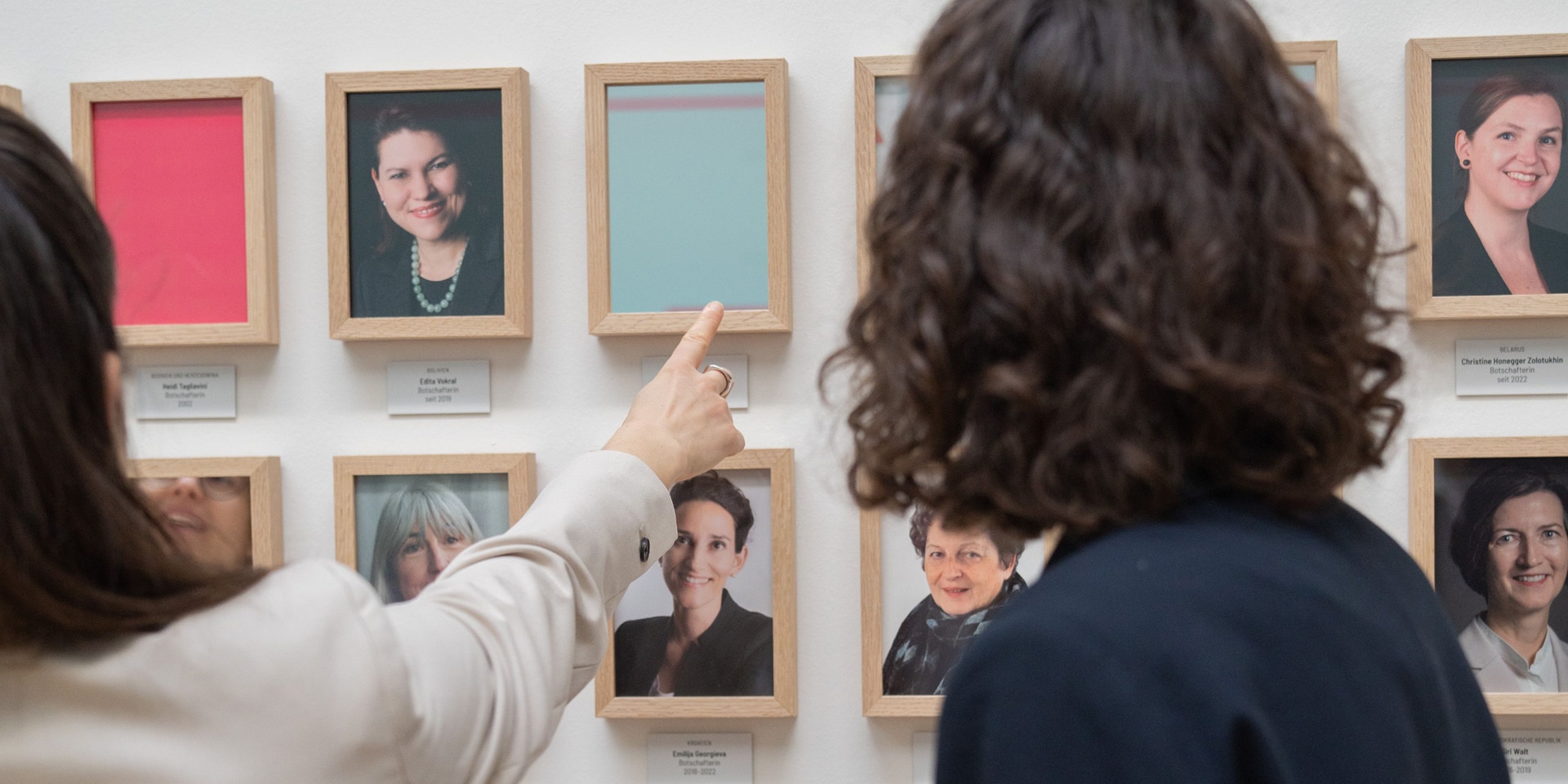The other perspective
24 June is the International Day of Women in Diplomacy, making this the ideal time to ask how women are faring in diplomacy and where we stand today in terms of gender parity. A Swiss diplomat shares her experiences.

To mark the International Day of Women in Diplomacy, a Swiss female diplomat reports on how women are faring in diplomacy and where we stand today in terms of gender parity. © FDFA
Until the early 20th century, diplomacy was an all-male affair. In 1923, Alexandra Mikhailovna Kollontai became the first woman to enter the diplomatic arena in the role of ambassador. Switzerland followed suit in 1977, when Francesca Pometta was appointed the country's first female ambassador. From 1982 to 1987, she headed the Permanent Observer Mission of Switzerland to the United Nations in New York. Like the world itself, diplomacy has constantly changed and evolved.
As more and more women pursue diplomatic careers and occupy senior positions in international politics, a number of foreign ministries around the world are taking targeted action to offer women greater support and encouragement in applying for jobs. Among them is the Swiss Federal Department of Foreign Affairs (FDFA), whose Equal opportunities in the workplace: FDFA Action Plan 2028 commits it to promoting all aspects of diversity, including gender parity and appropriate representation of all four of Switzerland's linguistic communities. Under the plan, equal gender representation of 45–55% is to be achieved at all hierarchical levels by 2028, with the aim of bolstering a sustainable, fair and inclusive culture. The relevant admissions committee ensures equal representation of women and men among those embarking on a diplomatic career. Progress is evident, with the proportion of women in the diplomatic corps standing at 39.2% in 2024, a rise of 9.6% compared with 2013.
'Women, peace and security'
UN Security Council Resolution 1325, adopted in 2000, represented a significant milestone for inclusive participation in peace processes, and placed the issue of 'women, peace and security' (WPS) firmly on the international agenda. The resolution emphasises the vital role that women already play in conflict prevention and resolution, peace negotiations and wider peacebuilding measures, as well as the need to expand that role in the future. Switzerland adopted its first National Action Plan on Women, Peace and Security in 2007, since when a further three such plans have been issued.
Despite the visible progress, only 21% of ambassadors worldwide were women in 2023, while the proportion of Swiss female ambassadors in post was 26.5%. There is potential for improvement, especially given that peace agreements are 35% more likely to last if women are involved in the peace process. One reason for this is that peace negotiations are an important opportunity to redefine existing relationships and strengthen individual groups by working towards a fair distribution of power. Including women in diplomacy and peace negotiations will lead to a more just, sustainable and peaceful international society in the long term. The inclusion of women in diplomacy is therefore not just about achieving a gender quota, but about redefining existing structures and power relations.
How are the 21% faring in the world of diplomacy? Our Swiss female diplomats share their views:

What has been the biggest challenge in your career?
My previous posting in the Middle East, in a male-dominated society, was a particularly formative experience for me. I had to work very carefully to carve out my place and win respect in a leadership role, and prove my skills and professionalism to male employees and outsiders. I had to learn that resisting local power structures and customs is often counterproductive and that, to make progress on the things that matter to you, you need to adapt without caving in. Being a woman can actually help to open doors and channels. You do need to step outside your comfort zone, though.
What structural barriers still exist for women in diplomatic positions?
In my experience, the main barriers we face as women come from various persistent forms of prejudice and stereotyping, whether conscious or unconscious. Why does a woman with children still face more scrutiny over her ability to do the job than a man does in the same situation? Why are men still mainly judged on their professional qualities, while women are held to additional standards? Why are soft skills often undervalued in day-to-day management despite modern, scientifically-based leadership models? It's important to critically assess and explicitly address your own ways of thinking.
Are the dynamics of a negotiation different when women are at the table?
Rahel Pema: I'm impressed by the level of professionalism and diplomatic prowess at the UN here in New York, irrespective of gender. That said, as the profession is still male-dominated, some interesting informal networks have been established in which women from all parts of the world come together, exchange ideas, join forces, prioritise similarities over differences and look for solutions. That affects the dynamics. But then there's the other reality: women from all parts of the world sitting in a negotiating room debating the status of women in the world, and at the same time representing their governments' anti-women positions. That's hard to get your head around.
